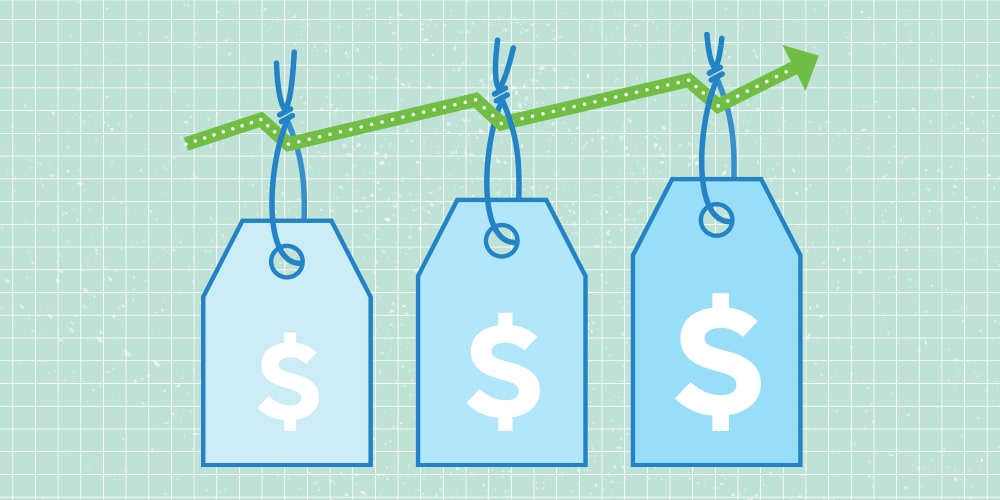Just as what goes up must come down, the low interest rates we enjoy today will inevitably rise. Eating into our spending power as they do so.
The Bank of Canada predicts our economy will rebound in late 2021 on the strength of vaccines and ongoing stimulus policy. As it does so, it can create the conditions for interest rates to be caught in the updraft.
Those nearing or in retirement recall the recession of the early 1980s, when mortgage rates rose to more than 20%. Many people were caught off-guard, including young families facing rates that ballooned swiftly.
While inflation isn’t expected to rocket in the near term, particularly in 2021, now is the time to get ahead of the curve rather than scrambling to react later.
How inflation impacts your money
Inflation weakens your purchasing power. In other words, your money will not be as valuable in 20 years as it is today.
For example, the $20,000 you may have spent on goods and services in the year 2000 would have cost you $28,417.79 in 2020, according to the Bank of Canada inflation calculator.
As inflation rises, traditionally so do interest rates. We’ve had such a lengthy period of low interest rates that many consider it to be normal, assuming it will last forever. It won’t.
Factors that can fuel inflation are:
- A growing economy
- Massive government spending
- Rising food and energy prices
The Bank of Canada is forecasting growth of around 4% this year, close to 5% in 2022 and around 2.5% in 2023. Global growth is expected to be a bit better, averaging over 5% in 2021 and 2022, and then 4% in 2023.
Combine this predicted economic growth with already rising energy prices and the federal government’s plan to launch a $100 billion stimulus package once the pandemic crisis eases — conditions are primed for rising inflation.
The Consumer Price Index is another barometer of inflation. It tracks price changes by comparing the cost of a fixed basket of goods and services over time.
So, we can see that it’s not a matter of if inflation will rise, it’s a matter of when.
Staying ahead with investments
Inflation hits hardest when investments don’t keep up with it.
Keeping up with inflation is important for all of us, including:
- Families carrying heavier debt loads
- Families with incomes squeezed by the pandemic
- Growing families who are used to spending but whose assets may be tied up primarily in their homes, facing higher mortgage costs down the line.
It’s also particularly important before you retire. Planning your portfolio to produce investment returns that help it stay well ahead of inflation will protect the standard of living you envision in retirement.
In the short term, inflation can undermine anyone who is sitting primarily on cash and investments that provide a low return, as it can erode their buying power. You can find balance with a wealth strategy that meets your desire for secure investments while keeping ahead of the curve.
So, what other investment strategies can help protect you from inflation? Here are just a few:
- Hold growth investments such as equity mutual funds* in your portfolio. This is one of the most effective ways to buffer inflation because stock market returns typically beat the inflation rate over the long term.
- Explore investments in sectors that benefit from inflation, such as commodities and real estate.
- Consider real return bonds* or real return bond mutual funds. Real return bonds protect purchasing power over extended periods because bond principal and interest payments are adjusted to reflect the rate of inflation.
- For those who are nearing or at retirement, it’s good to explore when to take the CPP retirement pension, depending on your circumstances, as these funds are indexed to inflation.
Whatever your investment style and preferences, an advisor can help you build a wealth strategy that will stay ahead of inflation and make your money work better for you.
*Mutual funds and other securities are offered through Aviso Wealth, a division of Aviso Financial Inc. Commissions, trailing commissions, management fees and expenses all may be associated with mutual fund investments. Please read the prospectus before investing. Unless otherwise stated, mutual fund securities and cash balances are not insured nor guaranteed, their values change frequently and past performance may not be repeated.
The information contained in this article was obtained from sources believed to be reliable; however, we cannot guarantee that it is accurate or complete. This article is provided as a general source of information and should not be considered personal investment advice or a solicitation to buy or sell any mutual funds and other securities.


